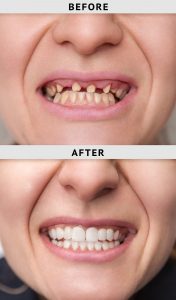Loss of teeth (edentulism) and damage to teeth occur for a variety of reasons, including periodontal (gum) disease, tooth decay and trauma. Causes of trauma include motor accidents, falls and sporting injuries. Even biting down too forcefully on a chicken bone can result in a chipped or cracked tooth requiring attention. “Edentulism is predominant in older adults but it is not just the elderly who are edentulous,” said Dr Hussein Al-Wakeel, Clinician-in-Charge of IMU Healthcare’s Oral Health Centre. “Our restorative dentists see people of all ages and from all walks of life who are missing teeth. This includes athletes with injuries sustained on the playing field and children who are brought in with injuries from accidents at home, school and the playground, as well as with tooth decay due to poor oral hygiene.”
| Effects: Losing More Than Just a Tooth |
|---|
| A missing tooth can give rise to various problems. Adjacent teeth can start to drift or rotate; and increased strain on remaining teeth can cause them to crack. Similarly, excessive strain on the temporomandibular joint (TMJ) can disturb the biting position of teeth and cause joint pain. Inadequate mastication (chewing) impairs digestion, and when chewing is difficult or painful, it affects what we eat. Studies have highlighted this correlation and, especially in the elderly, the choice to eat foods that are easier to chew rather than on nutritional value results in an imbalanced diet and poor nutrition. Missing teeth can of course have a visible effect on a person’s appearance, but it can also impair pronunciation and alter the way we talk. All these effects can cause a person to be self-conscious. Among younger people, in particular, psychological issues such as low self-esteem and low confidence can have long-lasting effects on quality of life. |
Solutions in Restorative Dentistry  Fortunately, help is at hand in the form of restorative dentistry. Restorative dentistry is the repair and replacement of damaged or missing teeth resulting from disease or trauma. A restorative dentist works to restore a person’s natural smile, prevent future oral health issues and ensure the person is able to maintain overall optimal health. There are now many options available in restorative dentistry. Commonly used methods include fillings, veneers, crowns (also known as caps), bridges, dentures and implants. The wider range of options has made it easier for people to find a solution that matches their budget and most importantly, achieves the desired objective—whether it is to help you chew nutritious foods, regain confidence, or improve the clarity of your speech.
Fortunately, help is at hand in the form of restorative dentistry. Restorative dentistry is the repair and replacement of damaged or missing teeth resulting from disease or trauma. A restorative dentist works to restore a person’s natural smile, prevent future oral health issues and ensure the person is able to maintain overall optimal health. There are now many options available in restorative dentistry. Commonly used methods include fillings, veneers, crowns (also known as caps), bridges, dentures and implants. The wider range of options has made it easier for people to find a solution that matches their budget and most importantly, achieves the desired objective—whether it is to help you chew nutritious foods, regain confidence, or improve the clarity of your speech.
| Implants are Taking Hold |
|---|
| Dental implants have become a popular option for tooth replacements as they are often more effective than conventional dentures or bridges in achieving the look and feel of natural teeth. Implants are artificial tooth roots made of titanium, a material compatible with human bone and which eventually fuses with the bone. An implant is surgically implanted into a person’s jaw bone, and a crown is then attached to the implant. The result is a stable and firmly anchored artificial tooth. A complete denture can also be anchored with as few as two implants. The result is greater stability when chewing and talking. Implants also help to preserve the bony structures of the jaw and prevent the facial muscles from atrophying due to a person’s inability to chew. Although there is no direct contraindication for dental implants, people with bone deterioration in the jaw or gum disease cannot receive implants immediately, as there would be insufficient bone in which to anchor the implants. Dental implants also require the recipient to commit to proper care. Poor oral hygiene habits can lead to pain, ulcers, gingivitis, infections and irritation. The initial consultation is important, as it is during this time that the treatment will be planned, and diagnostic imaging and other evaluations will be conducted to assess the patient’s jawbone and teeth. |
Restorative is Great, Preventative, Even Better Even with the numerous solutions offered by restorative dentistry today, Dr Wakeel reminds his patients to take proactive steps in preventative care. Edentulism can still occur due to trauma—accidents will happen—but other forms of tooth loss can be prevented just with the basics such as brushing twice a day with a soft-bristled brush and flossing regularly for healthy teeth and gums. “Regular visits to the dentist along with prompt treatment of dental disease is also important to prevent progression to the point of tooth loss,” said Dr Wakeel. “Smokers are more likely to get gum disease compared to their non-smoking counterparts. So if you’re a smoker, talk to your dentist about how to quit or reduce the number of cigarettes you smoke,” Dr Wakeel concluded. This article is brought to you by IMU Healthcare.









